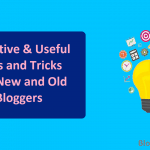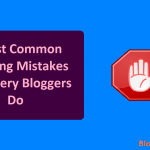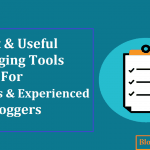There has never been a better time to be a blogger.
Thanks to the internet there’s accessibility, a platform and endless ways to research your content.
However, when you’re new to blogging, it can seem like a daunting task to get started.
Who can you ask for help?
What sort of guidance do you need?
Well we’ve compiled a list of tips that’ll benefit any and all beginner bloggers.
- Let Your Sincerity Show:
The sincerer you are the easier it is for your content to engage people. - Keep a Focused Approach:
Only focus on one social media platform at a time. Don’t spread yourself too thin and risk getting overwhelmed - Don’t Give Too Much Attention to Training:
Training can be helpful but it won’t change your blog overnight. You still need to do the work yourself. - Don’t Let Stats Rule Your Life:
Strike a balance between keeping tabs and letting your life revolve around stats. There’s no harm in monitoring growth so long as you don’t obsess over it. - Don’t Be A Sell Out:
Don’t buy into every offer a brand makes to get exposure. While there is money in it, you also risk losing the good faith of your followers. - Take Breaks:
If you are home-based, remember to unplug once in a while for your own peace of mind. - Self-Host:
Self-Hosting your blog is advisable because it offers more personal control to the blogger. - Don’t Be A Perfectionist:
Do your best and don’t be too self-critical. - Make a Schedule:
Plan out your posts and keep track of how often you’re posting in a day. - Network with Others In Your Niche:
Consider this part of your marketing strategy, it creates potential for collaborations and shoutouts. - Develop A Link-Building Strategy:
Important for search engine traffic. Try to secure backlinks from the most popular blogs in your niche. - Interact with Your Followers:
Reply to their comments or ask them questions in your posts. Make sure they feel acknowledged. - Guest Posting:
A great way to secure backlinks while also guaranteeing exposure. - Design Your Blog to Be User Friendly:
No clutter or confusing layout. Keep it easy to navigate and clearly labelled. - Use Intriguing Titles:
Grab the reader’s attention from the very get-go. - Make Sharing Your Posts Convenient:
Allow it to be conveniently posted to social media to give your content a wider audience. - Write as Much as Needed:
Be careful that you aren’t writing too much or too little. Make your point and cut anything extra. - Have Conviction:
Don’t be afraid to stick to your opinion, but also be willing to admit when you’re wrong. - Be Patient:
Persistence is key to success. - Do A Lot of Writing:
It’s easier to come up with ideas when you keep writing. - Prepare for Hate:
Getting hate is a sign of relevance. Don’t let it discourage you. - Distinguish Between Creating and Reacting:
Stay alert, of which one you’re doing. - Build an Emailing List:
In the event you’re looking to promote or sell something. - Let Your Audience Be Your Muse:
Make posts that answer questions posed by your followers. - Understand Your Demographic:
Do research on what your audience is looking for and gear your blog to accommodate their tastes. - Have A Call-To-Action:
End your posts with a message that tells people to subscribe/follow if they like your content. - Giveaways:
People love free stuff. Try to arrange these once in a while. - Post Regularly:
An inconsistent schedule risks losing traffic. - Write Shorter Sentences:
Readers are likely to pay attention more this way. - Use Google Analytics:
An easy way to keep track of topics, keywords and the audience. - Give Your Content Substance:
Filling your posts with filler or fluff will do more harm than good. - Outline Posts:
Make a list of topics you feel comfortable covering to keep track of your ideas. - Use Blog Topic Generators:
A convenient way to get ideas based on your keywords. - Write Lists:
Lists convey information quickly so people are more likely to read them - Use Paragraphs:
Readers dislike large walls of text. - Blockquotes and Italics:
Add emphasis to your words and highlight what the audience should notice. - Use Images:
They enhance the presentation of the work. Make sure they are free to use - Write Conclusions:
Some readers skip to the end of a post, write a conclusion so they don’t miss out. - Spellcheck:
Self-explanatory, but make sure there are no typos as well. - Proofread:
Go over your work to ensure you haven’t missed anything or made any mistakes. - Research Thoroughly:
The information you present should be accurate and not out-dated. - Submit Your Posts to Bookmarking Sites:
Popular or not, this gets you some exposure. - Repurpose Your Posts:
Use audio, video, etc. to spread your content to other avenues. - Make Your Content Original:
Copying others makes your content less unique and less interesting. - Don’t Focus on Broad Topics:
Making your focus too broad can lead to shallow writing, pick topics where you can go in depth. - Promote Offline:
Every bit of promotion counts, try to attend events such as trade shows to spread the word. - Learn How SEO Works:
Extremely important for all bloggers. Many resources are available on the internet. - Monetise Your Blog:
Don’t be afraid to start using Google Adsense. Money is a great motivator. - Don’t Compare Yourself to Others:
While natural, it only serves to discourage you. - Look Up Tutorials If Unsure:
It’s better to be safe and find a tutorial for something rather than risk any mistakes. - Work Smart:
You don’t need to write every day, but make sure to write several posts when motivated so you still have content to publish on days where you haven’t been able to write anything. - Use Plugins Sparingly:
Adding too many clutters your blog. - Music:
Listening to a song or album as you write can help inspire/motivate you. - Don’t Worry About Repeating Topics:
Diehard fans may complain, but newer readers get access to content they haven’t seen before. - Don’t Get Bogged Down by Editing:
Focus more on creating content rather than worrying too much about edits. - Write How You Speak:
Your flow will feel more natural to the audience. - Strive for Improvement:
Don’t get complacent, keep trying to outdo yourself. - Avoid Writing in Terms of Mass Appeal:
Make your writing appeal to one sort of person as opposed to making it general for the masses. - Write Based on Your Mood:
Forcing yourself to write when in the wrong frame of mind does more harm than good. - Write Down Your Ideas:
This way you can’t forget them. - Treat Research and Writing as Different Phases:
Breaking up the process a little makes it easier to get work done. - Combine Ideas Across Different Fields:
Your ideas come off more unique if you mix topics. For example: sociology and religion - Set Limits on Your Creativity:
Sometimes working under certain paradigms can provide great inspiration. - Maintain Your Stream of Consciousness:
Push yourself to write everything in one go as opposed to deleting your words as you write. - Be Open to Making Lists:
It’s easier to compile information in this format. - Make The Audience Suggest Topics:
A great way to engage readers and find ideas for posts. - Write Timeless Content:
Avoid referencing or discussing things that attach a ‘time’ to your posts. This is most applicable for technology. - Have A Sense of Purpose:
Remind yourself of your motivation for blogging. - Don’t Ask for Feedback On Ideas:
It’s better to just write the posts as getting feedback can lead to you being discouraged. - Value Your Own Approval Most of All:
If common consensus dislikes one of your posts, don’t be affected. Be proud of your work regardless. - Appreciate Your Critics:
Constructive feedback can help you improve your content. - Keep Your Blog Open Source: Letting people use your content freely allows your work to reach a broader audience.
- Allow Yourself To Have Fun:
Once something becomes a chore it’s hard to stay dedicated. - Offer Advice:
Don’t just discuss what’s wrong. Offer some kind of solution to keep your content more meaningful. - Let Yourself Be Ignorant:
Be open to learning even when you are an established blogger. - Quality Over Quantity:
Don’t overload your blog with content just for the sake of posting. Make each post matter. - Content Before Design:
What you publish is a bigger priority, don’t get too caught up with the layout. - Develop A Writing Voice:
Give your words a sense of identity and work on developing your writing style. - Be Careful with Media Attention:
Don’t get starry eyed as it’s very easy to get manipulated or tricked in these matters. - Ignore Trolls:
They provide no meaningful responses and are best avoided.








